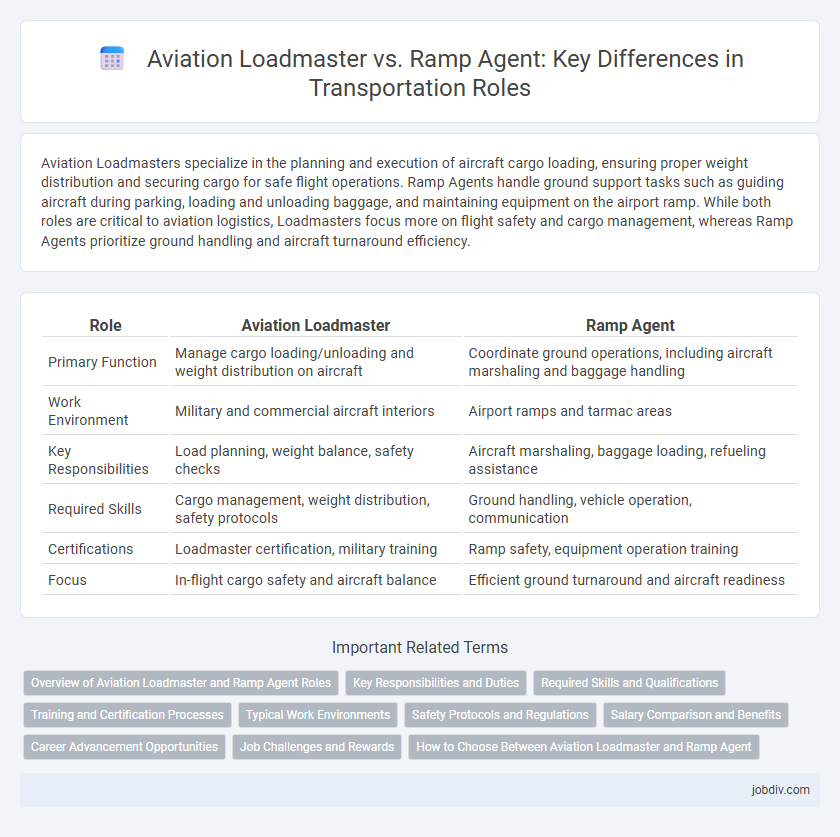Aviation Loadmasters specialize in the planning and execution of aircraft cargo loading, ensuring proper weight distribution and securing cargo for safe flight operations. Ramp Agents handle ground support tasks such as guiding aircraft during parking, loading and unloading baggage, and maintaining equipment on the airport ramp. While both roles are critical to aviation logistics, Loadmasters focus more on flight safety and cargo management, whereas Ramp Agents prioritize ground handling and aircraft turnaround efficiency.
Table of Comparison
| Role | Aviation Loadmaster | Ramp Agent |
|---|---|---|
| Primary Function | Manage cargo loading/unloading and weight distribution on aircraft | Coordinate ground operations, including aircraft marshaling and baggage handling |
| Work Environment | Military and commercial aircraft interiors | Airport ramps and tarmac areas |
| Key Responsibilities | Load planning, weight balance, safety checks | Aircraft marshaling, baggage loading, refueling assistance |
| Required Skills | Cargo management, weight distribution, safety protocols | Ground handling, vehicle operation, communication |
| Certifications | Loadmaster certification, military training | Ramp safety, equipment operation training |
| Focus | In-flight cargo safety and aircraft balance | Efficient ground turnaround and aircraft readiness |
Overview of Aviation Loadmaster and Ramp Agent Roles
An Aviation Loadmaster is responsible for planning and overseeing the safe loading, securing, and unloading of cargo on aircraft, ensuring weight and balance compliance essential for flight safety. A Ramp Agent handles ground operations, including aircraft marshaling, baggage handling, and coordinating the movement of cargo and equipment on the ramp. Both roles are critical in aviation logistics, with Loadmasters focusing on in-flight cargo management and Ramp Agents managing ground support activities.
Key Responsibilities and Duties
Aviation Loadmasters specialize in calculating and managing aircraft weight and balance to ensure safe and efficient cargo loading, coordinating closely with the flight crew to monitor cargo distribution during flight. Ramp Agents focus on ground operations including aircraft marshaling, baggage handling, equipment operation, and ensuring timely loading and unloading of passengers and cargo on the tarmac. Both roles are critical for maintaining safety standards and operational efficiency in air transportation logistics.
Required Skills and Qualifications
Aviation Loadmasters require expertise in weight and balance calculations, cargo securing techniques, and an in-depth understanding of aircraft systems to ensure safe and efficient loading operations. Ramp Agents need strong physical stamina, knowledge of ground support equipment, and proficiency in coordinating aircraft movements on the tarmac. Both roles demand excellent communication skills, attention to detail, and the ability to work under pressure in fast-paced aviation environments.
Training and Certification Processes
Aviation Loadmasters undergo rigorous military or specialized training programs that cover aircraft weight and balance, cargo loading techniques, and safety protocols, often requiring certification through branches like the U.S. Air Force or Navy. Ramp Agents receive commercial training focused on ground handling, aircraft marshaling, baggage handling, and ramp safety, typically acquiring certifications from organizations such as the Aircraft Ground Handling Committee (AGHC) or International Air Transport Association (IATA). The Loadmaster's certification emphasizes operational mission readiness and load planning, while Ramp Agent credentials prioritize ground operations efficiency and regulatory compliance.
Typical Work Environments
Aviation loadmasters primarily operate within military and cargo aircraft environments, managing cargo loading, weight distribution, and securing freight to ensure flight safety. Ramp agents work mainly at commercial airports, coordinating ground operations such as aircraft marshaling, baggage handling, and aircraft servicing. Both roles require working outdoors in variable weather conditions and often involve physically demanding tasks on active airfields.
Safety Protocols and Regulations
Aviation Loadmasters and Ramp Agents both play crucial roles in adhering to safety protocols and regulations, but their focus areas differ significantly. Loadmasters ensure the proper weight distribution and secure loading of cargo to maintain aircraft balance and comply with FAA safety standards, while Ramp Agents concentrate on ground operations, including aircraft marshalling, refueling safety, and adherence to OSHA regulations. Both roles require rigorous compliance training to mitigate risks and ensure operational safety in aviation environments.
Salary Comparison and Benefits
Aviation loadmasters typically earn a higher salary than ramp agents due to their specialized roles in cargo weight distribution and flight safety management, with average annual pay ranging from $50,000 to $70,000 compared to ramp agents' $30,000 to $45,000. Loadmasters often receive enhanced benefits including comprehensive health insurance, flight-related hazard pay, and retirement plans, whereas ramp agents usually have standard employee benefits with fewer specialized allowances. Career advancement opportunities and pay incentives are more pronounced for loadmasters, reflecting their critical responsibility in aviation logistics and operations.
Career Advancement Opportunities
Aviation Loadmasters often have greater career advancement opportunities due to their specialized responsibilities in cargo management, load planning, and in-flight weight distribution, which can lead to roles in flight operations management or logistics coordination. Ramp Agents typically focus on ground handling tasks such as aircraft marshaling, baggage handling, and equipment operation, with pathways advancing towards supervisory or safety compliance positions within ramp operations. While both roles offer career growth, Loadmasters generally access broader leadership positions in aviation logistics and operational planning.
Job Challenges and Rewards
Aviation Loadmasters face the challenge of managing cargo weight and balance for military and commercial aircraft, ensuring safe and efficient load distribution under tight deadlines. Ramp Agents encounter physically demanding tasks such as loading and unloading luggage, guiding aircraft on the tarmac, and handling weather-related disruptions. Both roles offer rewards in teamwork, problem-solving, and play crucial parts in maintaining aviation safety and operational efficiency.
How to Choose Between Aviation Loadmaster and Ramp Agent
Choosing between an Aviation Loadmaster and a Ramp Agent depends on your interest in operational responsibilities versus ground support tasks. Aviation Loadmasters specialize in aircraft weight distribution, cargo securing, and in-flight load management, requiring advanced training in aircraft systems and safety protocols. Ramp Agents focus on aircraft ground handling, including baggage loading, refueling, and coordinating aircraft movements, making physical endurance and quick logistical skills essential for the role.
Aviation Loadmaster vs Ramp Agent Infographic

 jobdiv.com
jobdiv.com